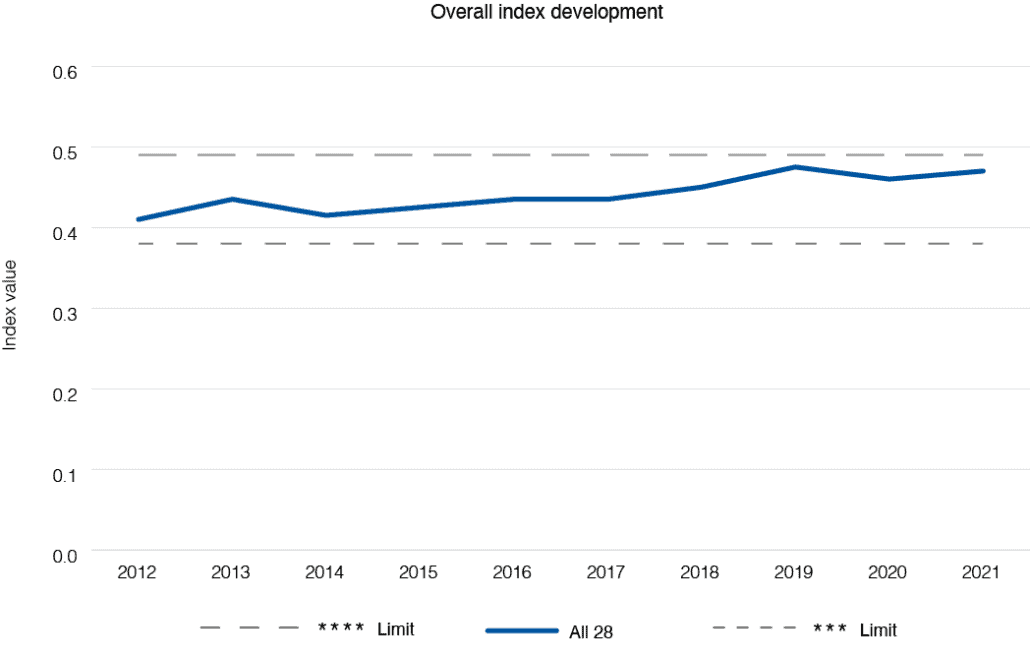STINT, the Swedish Foundation for International Cooperation in Research and Higher Education, annually publishes an index measuring the internationalisation of Swedish higher education institutions. The new results show that the pandemic clearly already had less of a negative impact in 2021.
Six different dimensions of internationalisation are included in the index, which covers 28 higher education institutions (HEIs). The results launched now are based on 2021 data. One to five stars are awarded per dimension, and another for the overall result. Around half of the HEIs now regain a star for student mobility, i.e. the proportion of students who have studied abroad or travelled to Sweden to study. Clearly the effects of the pandemic on this dimension topped in 2020.
In addition to the return of student mobility to almost the same levels as before the pandemic, most of the other dimensions show relatively small changes compared to 2020, as far as the overall result for all 28 HEIs is concerned. International staff mobility has however increased for a number of years running, in particularly the share of staff doing research abroad for a period. This is most likely mainly due to international recruitment. It may also be the case that more researchers had worked abroad for a period and then returned to Sweden.
The proportion of courses and degree programmes offered in languages other than Swedish shows a slight decrease. Otherwise this proportion had steadily grown during near all years STINT has published the index, starting at around 16% and peaking last year at 23%.
The diagram below shows how all 28 HEIs have developed according to the index. It illustrates that the pandemic only caused a small dip during 2020 and that the 28 HEIs are overall slowly but surely heading for the 4-star threshold.

Four HEIs have each gained a star while three have lost one each. Karolinska Institutet (KI) has joined Chalmers University of Technology, KTH Royal Institute of Technology, Stockholm School of Economics and the Swedish University of Agricultural Sciences at the top with five stars as the most international HEIs in Sweden. KI has long conducted much international research, and has gained its fifth star mainly through increased student mobility. In addition, during 2021 the KI leadership was one of few in Sweden with extensive international academic experience.
The table gives the results for all HEIs. Arrows indicate changes compared to last year’s results. See STINT’s homepage for a detailed description of the method followed to generate the index, as well as for detailed descriptions of the development of internationalisation at each individual HEI since 2012, in the dimensions of research, students, staff and leadership. See STINT Internationalisation Index.
| Data for 2021 | Total | |
|---|---|---|
| Blekinge Institute of Technology | **** | |
| Chalmers University of Technology | ***** | |
| Dalarna University | ** | |
| Halmstad University | *** | |
| Jönköping University | **** | |
| Karlstad University | *** | |
| Karolinska Institutet | ***** | |
| Kristianstad University | * | |
| KTH Royal Institute of Technology | ***** | |
| Linköping University | *** | |
| Linneaus University | *** | |
| Luleå University of Technology | **** | |
| Lund University | **** | |
| Malmö University | ** | |
| Mid Sweden University | *** | |
| Mälardalen University | *** | |
| Stockholm School of Economics | ***** | |
| Stockholm University | **** | |
| Swedish U. of Agricultural Sciences | ***** | |
| Södertörn University | * | |
| Umeå University | *** | |
| University of Borås | ** | |
| University of Gothenburg | *** | |
| University of Gävle | ** | |
| University of Skövde | **** | |
| University West | ** | |
| Uppsala University | **** | |
| Örebro University | *** | |

